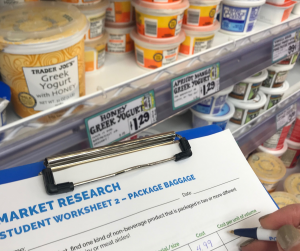Walking through a supermarket, a pharmacy, or most any store, it is clear that we are embedded in a massive global marketplace that offers a wide array of goods and services. If you’re anything like me, the diversity of product choices and the number of decisions we need to make can be more overwhelming than beneficial. I can barely decide what socks I’m going to wear, let alone what brand and flavor of sauce I should buy for my pasta (don’t get me started on choosing the shape).
Being a Responsible Consumer
But as consumers, we’re also wielding a substantial amount of influence by choosing certain products, sometimes called “voting with your wallet.” Our choices have far-reaching consequences for Earth and our society, ranging from how we use natural resources to the rights and treatment of workers around the world. And as such we have a duty to make informed, ethical purchases as much as we can.
Responsible consumerism that takes people and the planet into account is an integral part of global citizenship, and takes on more and more importance as our human (consumer) population continues to grow. This is of course much easier said than done, so let’s use palm oil as an example to explore the effects of consumption and think about how we can be more responsible consumers.
Palm Oil and its Perils
Palm oil is an edible vegetable oil that comes from the fruit and seeds of the oil palm tree originally located in the tropical rainforests of West Africa. It is the most widely consumed vegetable oil in the world, found in roughly 50% of products people purchase and use daily.
Palm oil is great for cooking because of its texture and lack of smell, while its natural preservative properties make it an ideal ingredient in packaged foods like chocolate bars, crackers, cookies, ice cream, and bread. Palm oil is a primary component in most cosmetics and personal care products as well, included in soaps, skin creams and shampoos (just to name a few). Also, palm oil is processed for biofuels used in cars and other vehicles, especially in Europe.
Our extensive use of palm oil has serious ramifications for both natural and human communities. The high demand for palm oil across industries is a major driver of tropical rainforest deforestation as land is cleared for more oil palm trees. This effect is most intense in Indonesia and Malaysia, but significant tropical forest loss due to the palm oil industry increasingly occurs in Central Africa as well as South and Central America.
Destroying these precious forests eliminates a host of essential ecosystem services such as climate regulation, nutrient cycling and carbon sequestration. And as some of the most biodiverse regions on the planet, cutting down tropical rainforests threatens a distressing number of Earth’s species including the Tapanuli orangutan and the Sumatran tiger. Air pollution from “slash and burn” deforestation practices can have adverse health consequences for nearby communities, and expanding palm oil plantations have displaced indigenous people.
4 Strategies to Buy Palm Oil the Right Way
1. Like any product that is made with environmentally controversial materials (shark fin soup, ivory, rhino horn), the first thing we can do is stop or reduce our consumption to lower demand for the product. As we discussed earlier, palm oil is fairly pervasive in packaged foods. We could all benefit from buying more whole, healthful foods and less processed snacks, but there are also processed, packaged products out there that do not include palm oil. Do some label investigations of your preferred products the next time you’re at the store! But be careful: manufacturers are good at hiding palm oil ingredients with alternative names (see image).
2. There is also a growing movement to use certified palm oil that is sourced from sustainable, labor-friendly farms. Look out for goods labeled with the Roundtable on Sustainable Palm Oil (RSPO) certification (or the others below), and take every chance to promote sustainable palm oil by voting with your wallet!
3. Consumers can have influence beyond how we spend our money. Say you discover that palm oil is a primary ingredient in your favorite brand of tea biscuit or chocolate hazelnut spread (looking at you, Nutella). Pick up the phone and call the company, tweet at them or leave a message on their Facebook wall! When we voice our concerns to the brands we buy through calls, letters, emails and social media content, we’re sending them a strong message that this issue matters to us consumers.
4. Lastly, never underestimate the impact of discussing these issues with your own family, friends and communities. People pay attention to the ones they care about, and fixing the palm oil industry starts with educating everyone about the systemic problems involved.
Palm oil is just one of many products and services with consequences we need to be conscious of in order to be ethical, sustainable consumers. With our growing human population, our small choices and purchases quickly add up to create significant impacts on people and the planet. When we’re responsible consumers who examine our own daily decisions, we can minimize the damages and even support meaningful progress for society and the environment.



